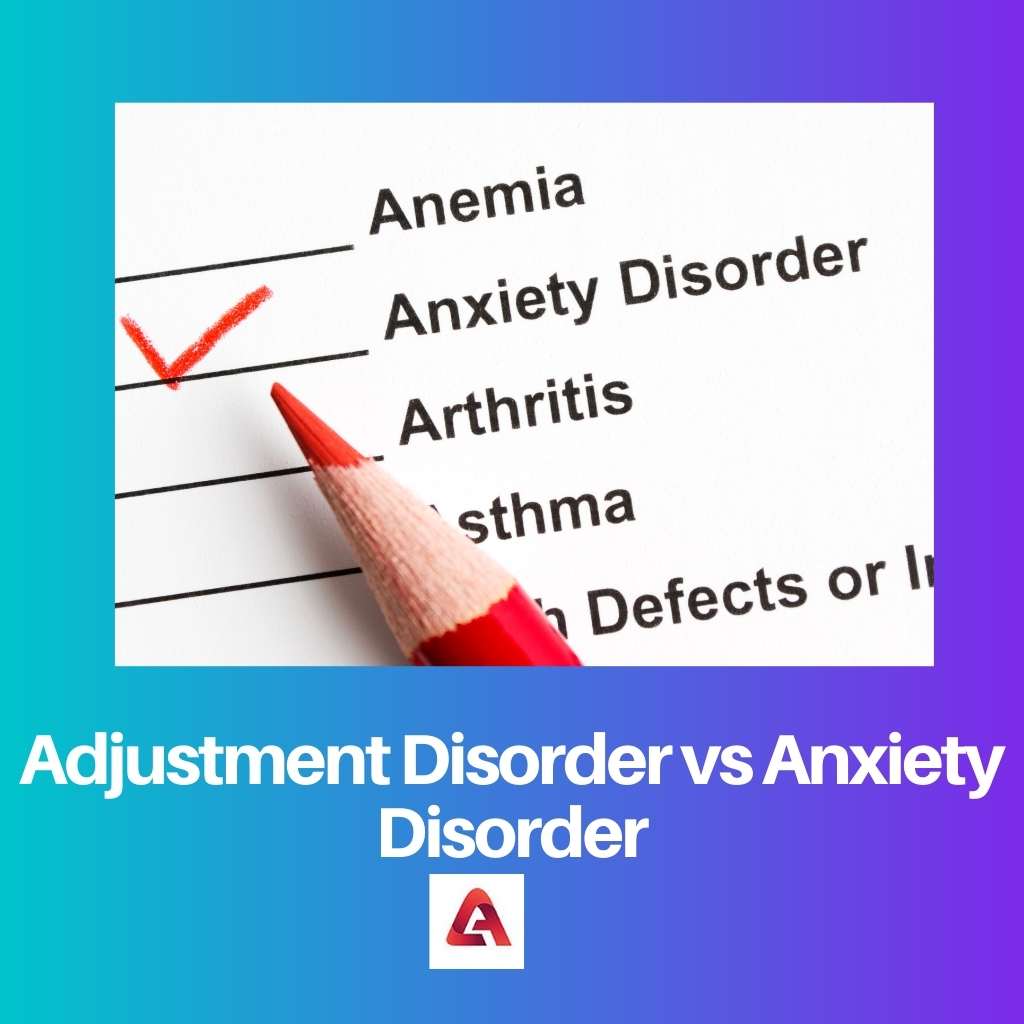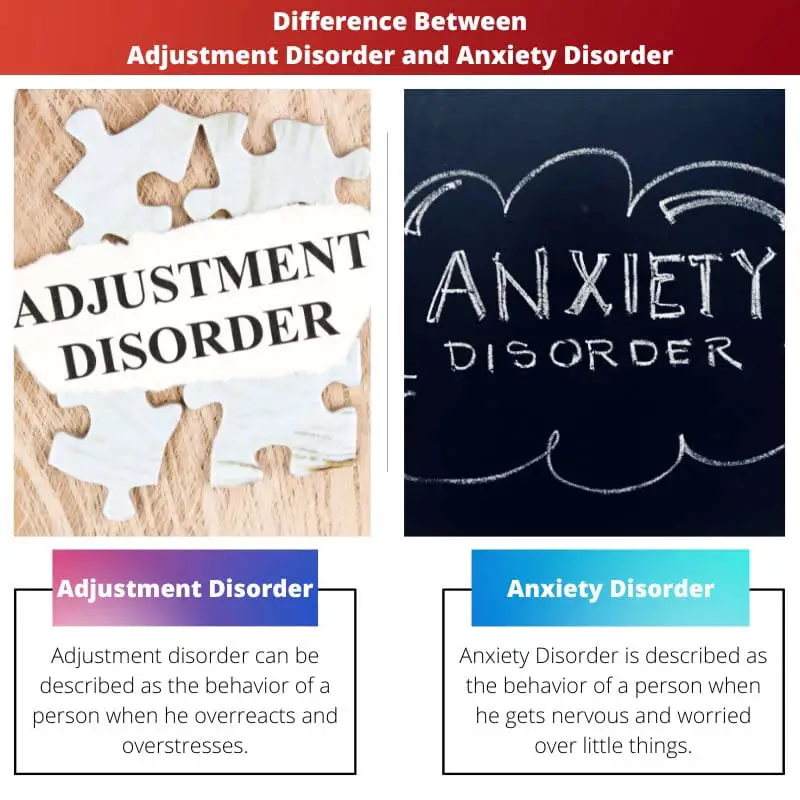Mental health is as important as physical because it can make a person physically weak. The modern lifestyle is getting more and more hectic where people do not have time to spend on things that they like.
This careless behavior of people leads to several mental disorders such as adjustment disorder and anxiety disorder.
Key Takeaways
- Adjustment disorder is a short-term emotional or behavioral response to a specific stressor, while anxiety disorders are chronic mental health conditions characterized by excessive fear or worry.
- Adjustment disorder symptoms resolve within six months, whereas anxiety disorders can persist for years without treatment.
- Treatment for adjustment disorder focuses on coping strategies and support, while anxiety disorders may require medication and long-term therapy.
Adjustment Disorder vs Anxiety Disorder
Adjustment disorder is a condition that occurs in response to a stressful or traumatic life event, such as a divorce, a move, or a job loss. Anxiety disorders, on the other hand, are a group of conditions characterized by excessive and persistent worry or fear about everyday situations.

Adjustment disorders are associated with conditions related to stress. A person who has this disorder finds it difficult to interact with people.
Adjustment disorders can play a major role in creating problems in school, work, or more importantly in the relationship of that person. The level of stress gets higher in adjustment disorder.
Anxiety Disorder is one of the most terrible disorders one can have. Anxiety can be triggered by tiny events but can result in serious physical and mental damage.
Anxiety is a quite normal feeling that can be caused by events like speaking or dancing in front of people or before the most awaited results.
Comparison Table
| Parameters Of Comparison | Adjustment Disorder | Anxiety Disorder |
|---|---|---|
| Meaning | Adjustment disorder can be described as the behavior of a person when he overreacts and overstresses. | Anxiety Disorder is described as the behavior of a person when he gets nervous and worried over little things. |
| Duration | Adjustment disorder is considered to be the temporary state of stressful thoughts or depression that attacks suddenly. | Anxiety Disorder is an illness but is more like a habit that can be triggered by petite situations. |
| Cause | Adjustment disorder can occur due to stressful lifestyles and traumatizing events that happened in one’s life. | A person can get anxiety disorder from his family roots, mental illness, depression, a particular situation that simulates it. |
| Panic attack | If a person is suffering from adjustment disorder he might stress but he never gets panic attacks. | It is very common to get a panic attack if a person has an anxiety disorder. |
| Symptoms | Adjustment disorder can be diagnosed by noticing symptoms like sadness, negative thoughts, lack of appetite and sleep, etc. | A person with anxiety disorder shows symptoms like excessive sweating, heavy Breathing, rapid heartbeats, nausea, tiredness, etc. |
What is Adjustment Disorder?
A person who suffers from adjustment disorder is liable to experience more stress than a normal person. It leaves a negative effect on the life of that person by bringing sudden changes in emotional behavior.
The response to a stressful event or situation becomes excessive that can even influence the physical health of the person.
However, adjustment disorder does not consider a mental illness instead it is described as a massive response to the situation which stressful.
A person can get very sensitive and emotional when suffering from this disorder. The symptoms of adjustment disorder are also not easy to explore since they can be different from person to person.
This disorder changes the way of thinking when a tiny amount of stress seems to be a big mess.
But to identify if the person is suffering from adjustment disorder, one can look for symptoms like if the person cries frequently if he’s having trouble sleeping and loss of appetite if he is facing problems doing normal activities or he is showing some kind of suicidal thoughts.
People with this disorder become unable to enjoy things in their lives and get sad and stressed quite hurriedly.
If a person notices such behavioral change in someone else or maybe himself, he should reach to friends and family, therapists, psychologists as soon as possible.
What is Anxiety Disorder?
A stressful period is known as anxiety and it is triggered by a lack of confidence or sometimes insecurities.
It causes a person to have fears about certain things and most of the time, it is associated with overthinking and a common response of the brain towards stressful events.
It is a function of the brain that is useful to alert the person from upcoming danger.
When this feeling of anxiety becomes massive and out of control it is known as Anxiety Disorder. Common symptoms like increased heartbeat, fatigue, rapid breathing, sweating, shaking can be observed in the person with anxiety Disorder.
Anxiety can be divided into parts such as panic disorder, phobias, social anxiety disorder, separation anxiety, etc.
This disorder can make a person worried and afraid of certain things. And when it gets more serious a person might face issues like shortage of breathing, lack of sleep, remaining still, difficulty in concentration, etc.
A person with anxiety disorder can not be calmed down easily and he can even be nauseous.
His hands and body get shaky and his mouth gets all dry. The major causes of Anxiety Disorder according to experts can be genetics, abuse of a certain drug, environment, and some kind of medicine.

Main Differences Between Adjustment Disorder and Anxiety Disorder
- When a person suffers from adjustment disorder, by controlling his actions, he might hide them. While anxiety disorder is hard to disguise since it shows more physical symptoms.
- Adjustment disorder does not necessarily result in panic attacks. On the other hand, anxiety disorder is most likely to lead to a panic attack.
- A person with adjustment disorder might look physically fit while in anxiety disorder, the person can also get physically sick and weak.
- Adjustment disorder occurs by a sudden change in normal lifestyle, for example, death or birth. While anxiety disorders are caused by depression and can be genetics.
- Adjustment disorder can be shown in action from time to time since it is more irregular and associated with certain conditions while anxiety disorder can last longer and be more frequent.

- https://link.springer.com/article/10.2165/11311000-000000000-00000
- https://www.sciencedirect.com/science/article/pii/S0140673608604882

The article captures the essence of the two disorders but may have overlooked the impact of mental health awareness and societal factors influencing them. It can be further enriched by including this angle.
An insightful portrayal of the stark contrast between adjustment and anxiety disorders. The depth of detail cultivates a profound comprehension of these conditions, igniting critical conversations about mental well-being.
The information shared can lend to a greater understanding of the warning signs linked to these disorders. It challenges perceptions and deepens knowledge about mental health in a refreshing manner.
The article adeptly dissects the complex nature of these disorders, shedding light on the varying impact they have on an individual’s life. It’s a significant step in opening dialogue about mental health.
The article’s meticulous approach advocates for a holistic understanding of mental health, steering away from taboos to promote an educated discourse. A commendable effort to unveil the intricacies of adjustment and anxiety disorders.
The article provides a clear and concise comparison between adjustment and anxiety disorders, emphasizing the importance of mental health. It’s an eye-opener for those who may not be aware of the severity of such conditions.